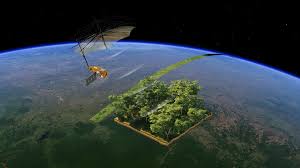Biomass Satellite Mission:

The European Space Agency (ESA) will launch the Biomass satellite mission in end of April, 2025, aboard the Vega C rocket.
- Biomass is ESA’s seventh Earth Explorer satellite mission under its climate and Earth systems programme.
- It will map global forests and measure carbon levels to assess forest health and its role in the carbon cycle.
- The European Space Agency (ESA) leads the mission, with collaboration from researchers across Europe.
- The launch will take place from French Guiana using Vega C, ESA’s satellite launcher.
- Aim of the Mission:
- To quantify forest biomass and carbon content from space using radar.
- To generate accurate 3D models of forest structures and track changes in biomass over time.
- Key Features of Biomass Mission
- P-band SAR Technology: First satellite to use P-band Synthetic Aperture Radar with 70 cm wavelength for deep forest penetration.
- 12-metre Radar Antenna: A large deployable antenna will scan forest canopies and ground biomass structures.
- Carbon Flow Monitoring: Tracks carbon absorption and release, improving understanding of climate feedback loops.
- Global Coverage: Covers tropical and boreal forests and monitors ice sheet movement and terrain models.
- Sun-Synchronous Orbit: Operates at 666 km altitude, ensuring consistent lighting conditions for measurements.




